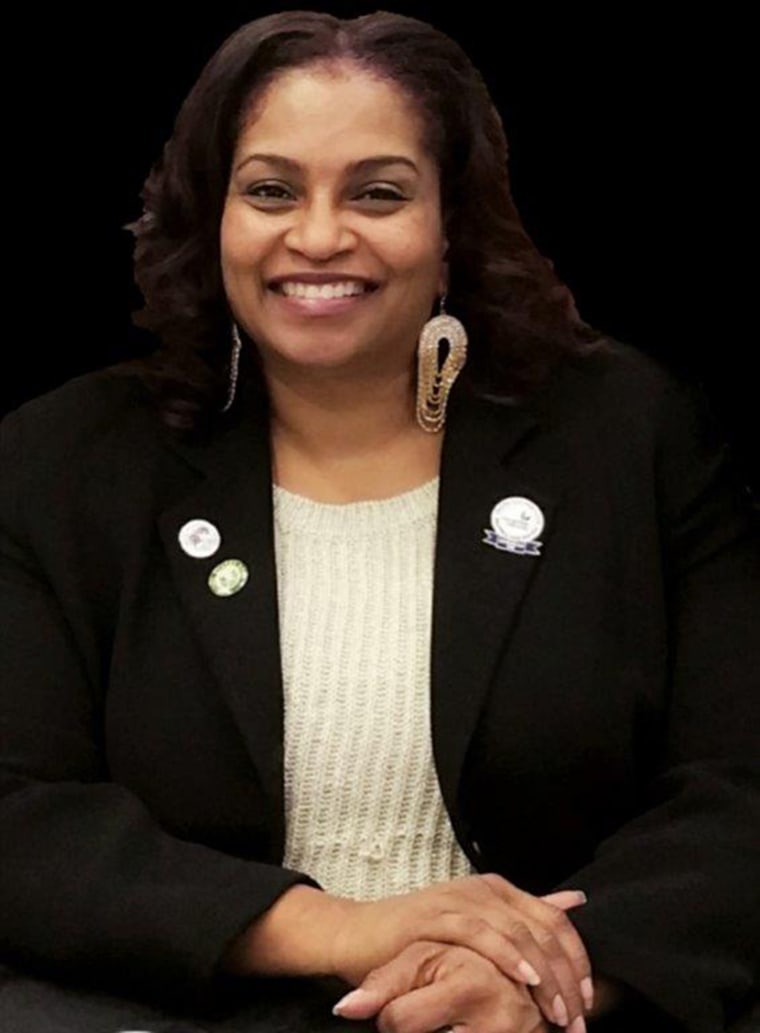Most days, BriGette McCoy does just fine.
Her work advocating for the victims of military sexual assaults and female veterans keeps her busy and her mind off of the painful memories of being raped at 18 — twice in one year — during her stint in the military.
This week, the raw emotion came flooding back when she learned, through the organization Protect Our Defenders, an advocacy group for victims of military sexual assaults, that the Pentagon may have mischaracterized how such cases are prosecuted in military courts.
McCoy, who testified before Congress in 2013 that an independent council — rather than commanders — should review military sexual assaults, said she feels “re-traumatized” by the news.
“Getting a report saying they, with air quotes, misled, it’s like wow, we know this, they’ve always misled,” said McCoy who sits on the advocacy group's board. “They are misleading you on the number of assaults, the number being prosecuted.”
Related: Reports of Sexual Assault in Military Increase Again
As reported this week by the Associated Press and confirmed by NBC News, documents obtained by a FOIA request by Protect Our Defenders raise new questions about the Pentagon’s claim that it was often more aggressive than civilian authorities in prosecuting sexual assault cases involving members of the military.
In testimony before the Senate Armed Services Committee on July 18, 2013, Adm. James Winnefeld, then vice chairman of the Joint Chiefs of Staff, said, for example, that Army commanders had pursued 49 sexual assault cases over two years after civilian authorities declined to prosecute, obtaining 25 convictions. He likewise stated that Marine Corps commanders prosecuted 28 cases declined by civilian prosecutors, resulting in 16 convictions.
Related: Testimony on Military Sexual Assault Prosecutions
"I would add, Senator McCaskill, some of these are very heinous cases that the DAs would not take,"Winnefeld said. "One of them was a 10-year-old autistic girl who was sexually assaulted. We took the case. The commander insisted on it, and a conviction was obtained."
However, in some of these cases, Protect Our Defenders asserts, there was an understanding with local law enforcement that the military would prosecute. The military acknowledges such working relationships and says the data presented during the hearing was a "snapshot".
The numbers from the Marine Corps, for example, were "in no way meant to be an exhaustive review of such cases, or be critical of local authority involvement," the Marine Corps said in a statement to NBC News on Friday.
Read: 2014 Report of the Response Systems to Adult Sexual Crimes Panel
Critics say Winnefeld's testimony helped undercut congressional support for bipartisan legislation seeking to remove authority to investigate sexual assault cases from military commanders and instead place it with military prosecutors.
The findings prompted Sens. Kirsten Gillibrand, D-New York and Charles Grassley, R-Iowa, to write to President Barack Obama this week urging him to look into “whether the Pentagon has accorded this issue the importance it deserves.”
Read: Letter to President on Military Sexual Assaults
“Due to the very serious nature of these allegations, we request that you direct an independent investigation into this matter,” the senators wrote.
“This definitely bears further review. Both the administration and this Congress should demand answers and accountability here,” Marc Brumer, a spokesperson for Gillibrand’s office, told NBC News.
Gillibrand was a sponsor of the 2013 legislation that would have removed the decision of whether to prosecute military sexual assaults from the chain of command, a move that the Pentagon vigorously opposed.
That measure ultimately failed to move forward after a procedural vote.
The defeat was notable in that it came after months of an intense split between Gillibrand and fellow Democrat and Armed Services Committee member, Sen. Claire McCaskill of Missouri. McCaskill, who like Gillibrand, sought reforms in the process and met with victims, felt that the military should work internally to make changes.
Related: Gillibrand, McCaskill Grill Military Leaders Over Handling of Sexual Assault
“I think it cannot be lost that this was told to Congress to stop senator Gillibrand’s bill with the warning that if this comes to pass there will be fewer prosecutions,” said former Air Force chief prosecutor Col. Don Christensen, who has retired and is now president of Protect Our Defenders. “That is extremely unfair to a lot of civilian jurisdictions that have fostered good relations with the military.”
The Pentagon on Friday pushed back against the notion that they deliberately misled Congress when Winnefeld, who has since retired, told lawmakers three years ago that removing the process from the chain of command would result in fewer military sexual assault prosecutions.
"Admiral Winnefeld's testimony and subsequent correspondence with members of Congress regarding the decision of the military to investigate and prosecute sexual assault cases after civilian authorities did not pursue a full investigation or formally declined to prosecute was a snapshot based on data available provided to him by the Services at the time,” Marine Lt. Col. Gabrielle M. Hermes, a Pentagon spokeswoman told NBC News in a statement.
The Pentagon also says they never mischaracterized the nature of how they work with civilian partners.
“In the adjudication of criminal charges, civilian prosecutors have different authorities than the military and can, depending on the jurisdiction, have different availability of resources to aid in these determinations,” Hermes said in a statement. “These combined factors have the possibility of resulting in different courses of action for both civilian and military authorities.”
For example, in any cases involving military personnel, the Marine Corps works closely with local authorities, said Maj. Clark Carpenter, a Marine Corps spokesman.
And sometimes the local authorities defer to the military, defense officials said.
"A declination can be formal or can be a ceding of jurisdiction. As such, declinations occur for many reasons, such as a determination from civilian authorities that there was insufficient evidence to pursue an investigation or charges, a deferral to military authorities, or the victim's preference or cooperation," Carpenter said in a statement. "Among all 28 cases, the Marine Corps obtained 14 convictions under Article 120 of the Uniform Code of Military Justice, which deals with rape, sexual assaults and other sexual misconduct. Additionally, the Marine Corps obtained convictions for collateral misconduct in five other cases."
Christensen calls the military's response "nonsensical."
Bottom line, he said, "They threw out numbers there was no basis for."
McCaskill’s office said the senator has asked each of the military branches for a briefing to get to questions of inconsistencies.
However, the senator’s office maintains that, despite the debate over the method of how the cases were characterized, the number of cases presented during testimony and in a report — at least 90 —show that commanders aren’t ignoring military sexual assaults.
“The importance of these cases is that they show definitively that commanders don’t sweep sexual assault cases under the carpet — on the contrary, the numbers continue to prove that commanders aggressively pursue courts-martial,” Sarah Feldman, a McCaskill spokesperson said in a statement. “Especially when stacked against the very few cases that show the opposite, these numbers starkly refute the central argument made by those who want to strip commanders of their ability to launch courts-martial.”
Related: 5% of Military Sexual Assault Reports End in Sentences: Report
The Pentagon reports there were 6,131 reported assaults in 2014 — a decrease of 11 percent from 2013.
But a RAND Military Workplace Study estimates there were 20,300 actual assaults, a number that would mean about 30 percent of sexual assaults in the military are actually reported.
The military points to efforts such as the creation by the Marine Corps of a victim legal advocacy programas proof that their efforts to support victims is working.
“That does show a commitment by commanders that sexual assault does not have a place in our system,” Carpenter said.

The Pentagon also says the climate is changing.
“Through decisive leadership, military commanders and leaders at all levels are committed in establishing and maintaining the proper command climate with the highest of standards while holding everyone accountable to those standards to ensure all service members are treated with dignity and respect,” Hermes said in a statement. “They are committed to combating, reducing and eliminating sexual assault - a crime that has no place in the military."
Changing perhaps, but not fast enough, say victims’ rights advocates.
“I was in for 23 years saw this from every side prosecutor, defense council and judge. One of the biggest problems we have is the people making the most critical decision have the least training and knowledge and they’re also the most distracted,” Christensen said. “We turn the decisions over to the generals to make these decisions. It brings in the politics of command on whether someone to be charged or not rather than those that have the legal experience to know what cases should go forward.”

McCoy, the sexual assault victim who testified in favor of removing the decision on whether to prosecute from commanders, now has a more immediate concern: her teenage daughter has expressed a desire to enlist.
“I struggle with whether she should go into the military or not,” she said.

